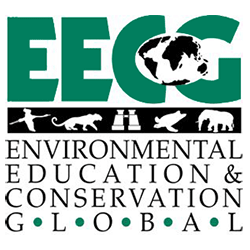| PROGRAMS | |
| Training. EECG’s primary program is the provision of training and professional development opportunities for education professionals in developing countries. EECG collaborates with individuals and organizations in target countries to help plan and conduct international training activities. The activities may range from weeklong workshops to three week courses. Most of these training activities focus on adults as target audiences of education efforts. They provide hands-on experience in the philosophy, techniques, and resources needed for the effective use of education as a tool to complement other efforts to preserve biological diversity. Environmental social marketing and communications strategies are an integral focus of these training activities.
All of EECG’s training activities use hands-on, experiential processes for learning and are based on the stated needs of the individuals and organizations with which it works. Although an individual course or workshop may be hosted in a particular country, training efforts are usually international in scope with participants from a variety of countries attending. This international scope enables course participants to gain a wider perspective of environmental issues and education techniques. EECG staff members are complemented by a dedicated network of professional educators/advisors who help with training and provide support once the course is completed. After the training, participants are invited to join the EECG network where they can exchange ideas, post questions, and receive advice and support from EECG and its network of advisors. EECG’s international training efforts have focused on Thailand, India, and Namibia. Core staff have conducted workshops and completed planning efforts in some ten additional countries. THE FOLLOWING TWO COURSES WERE RUN IN 2019. NO COURSES WILL BE CONDUCTED IN 2020. CKECK BACK TO SEE IF TRAINING WILL BE HELD IN 2021 2019 Applied environmental education courses in India and Thailand. (For more information on the courses see below, or contact Ed McCrea at emccrea@eecg.org.) The India course will be a 3-week international course in February of 2019 held in Assam, India near Kazaranga National Park. The course will focus on the use of education and communication strategies as effective conservation tools. Instruction will demonstrate how environmental social marketing techniques can be integrated with overall education and communication strategies to produce effective and practical tools for solving environmental problems. It will also create deeper understanding about services of ecosystems. Instruction will be in English. The course will cover: Research and theory on education for different audiences; educational techniques and strategies for different issues and audiences; programs and campaign planning and implementation;; communication strategies; environmental social marketing techniques; media production—theory and design; techniques for building support and obtaining resources for education campaigns; evaluation and monitoring The Thai course will be conducted at Chiangmai Zoo, September 5-11, 2019 in collaboration with the Zoological Parks Organization (ZPO). The course will focus on how to design and manage effective adult volunteer programs. It will look at why zoos develop adult volunteer programs. It will explore the benefits, challenges, and costs of such programs and how they can further a zoo’s conservation and environmental education objectives. Participants will examine the elements of successful adult volunteer programs including promotion, selection, training, supervision, coordination, retention, evaluation, and recognition. It will delve into the importance of integrating adult volunteer programs into the zoo’s ongoing operations. As a culminating activity, teams will design a draft adult volunteer program. Participants will include staff from ZPO zoos in Thailand as well as zoos in neighboring countries who will help manage and interact with adult zoo volunteers. The course will be conducted in English with translation into Thai. |
|
| Technical assistance. In addition to providing fundraising and other assistance to graduates of EECG international courses, EECG provides technical assistance to various individuals and programs around the world. | |
Most notable are two projects:
|
|


Environmental Education and Conservation Global
Environmental Education & Conservation Global provides professionals with resource and support in their efforts to create informed, environmentally literate, and active citizens.